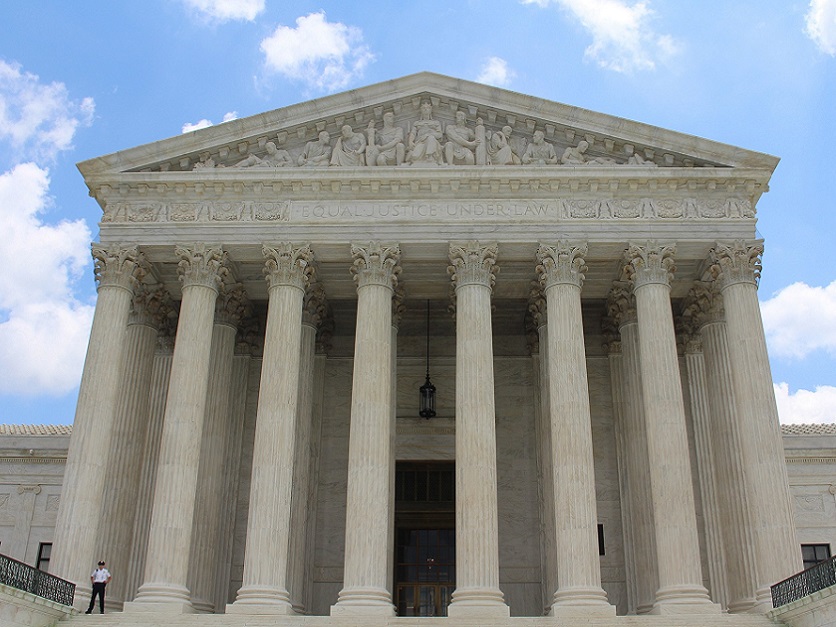The Supreme Court has dumped its Chevron doctrine that required courts to defer to federal agencies’ interpretation of ambiguous laws, in an opinion issued Friday that makes environmental and other laws vulnerable to legal challenges.
By a vote of 6-3, the court said the 1984 Chevron decision “defies the command of the [Administrative Procedure Act] that ‘the reviewing court’—not the agency whose action it reviews — is to ‘decide all relevant questions of law’ and ‘interpret … statutory provisions.’ ”
Chief Justice John Roberts wrote the opinion, in which he was joined by Justices Samuel Alito, Clarence Thomas, Neil Gorsuch, Brett Kavanaugh and Amy Coney Barrett. Justices Elena Kagan, Sonia Sotomayor and Ketanji Brown Jackson dissented.
Agencies “have no special competence in resolving statutory ambiguities. Courts do," Chief Justice John Roberts said from the bench, according to an account from SCOTUSblog.
In a concurring opinion, Justice Neil Gorsuch said, “Today, the court places a tombstone on Chevron no one can miss. In doing so, the court returns judges to interpretive rules that have guided federal courts since the nation’s founding.”
Dissenting, Kagan said Chevron “has formed the backdrop against which Congress, courts, and agencies — as well as regulated parties and the public — all have operated for decades. It has been applied in thousands of judicial decisions. It has become part of the warp and woof of modern government, supporting regulatory efforts of all kinds — to name a few, keeping air and water clean, food and drugs safe, and financial markets honest.”
The decision is a huge win for the dozens of industry groups that supported a challenge by fishing companies to a National Marine Fisheries Service rule requiring it to pay for the cost of observers on board their vessels.
In an amicus brief, the American Farm Bureau Federation and seven other groups, including the Agricultural Retailers Association, National Cattlemen’s Beef Association, National Pork Producers Council and the Meat Institute, argued that “a deference rule, as experience shows, makes it far too easy for agencies and courts to throw up their hands when faced with difficult statutory language and rely on deference rather than careful textual analysis.”
The Supreme Court “has already made great strides in curtailing agency overreach and restoring the separation of powers by reinvigorating the ‘major questions doctrine,’” the groups said, as when the court found EPA had exceeded its authority in setting greenhouse gas emissions rules for power plants.
“But most agency errors are more mundane, involving misreadings of or insufficient attention to statutory text, not the unauthorized determination of major policy questions,” the groups said. “In those more run-of-the-mill cases the Chevron doctrine continues to endorse unwarranted agency interpretations not intended by Congress.”
It's easy to be "in the know" about agriculture news from coast to coast! Sign up for a FREE month of Agri-Pulse news. Simply click here.
The court itself had not used Chevron in a decision since 2016. Nevertheless, at oral arguments Solicitor General Elizabeth Prelogar told the justices that “thousands of decisions” relying on Chevron to uphold agency action “would be open to challenge.”
“That disruption is especially unwarranted because Congress could modify or overrule the framework at any time,” she said.
Environmental groups also filed amicus briefs supporting the federal government in the case, saying, as Kagan did, that agencies are the best interpreters of often complicated environmental laws.
In its decision Friday, the court said decisions made previously that relied on Chevron would not be subject to review, based on the legal theory of stare decisis, which essentially mean courts have to follow their own precedent.
Reaction was swift and divided. Republicans in Congress hailed the decision. Montana Sen. Steve Daines called the ruling "a victory for freedom in Montana and around the country as it takes power away from unelected bureaucrats in Washington, D.C., who do everything they can to crush our Montana way of life. This ruling will help rein in climate activists at the EPA pursuing their political agendas by using overreaching regulations to kill traditional sources of power that are so important here in Montana. I commend President Trump for appointing justices to the Supreme Court who interpreted the Constitution through an originalist lens in this case.”
House Agriculture Committee Chairman Glenn "GT" Thompson said the court had "taken a significant step in reaffirming a core principle of our Constitution: the power to legislate rests with Congress. For too long, unelected and unaccountable bureaucrats have wielded unchecked power with wide-reaching implications. I welcome the Supreme Court’s ruling and the restoration of the balance of power between the Executive and Legislative branches."
On the other side, Food & Water Watch Executive Director Wenonah Hauter said the "reckless but unsurprising decision from this far-right court is a triumph for corporate polluters that seek to dismantle common-sense regulations protecting clean air, clean water and a livable climate future. This decision brings into sharp relief the critical importance of electing presidents who will appoint Supreme Court justices guided by science and sound legal precedent.
She continued, "Despite today’s misguided opinion, our strong environmental laws give EPA and other federal agencies authority to move forward with ambitious plans to protect our air, water, and climate. They must use it.”
Collin O’Mara, president and CEO of the National Wildlife Federation, said “the experience and expertise of experts — scientists, biologists, toxicologists, and others — are essential to implementing our foundational wildlife, public health, and environmental laws. The Supreme Court’s decision sidelines experts at the moment we need them to help safeguard and steward our wildlife, clean air and water, public health, and the environment.”
The court's ruling “overturns long-standing precedent and will limit agencies' ability to protect public health, address pollution, protect our waters and our ecosystems.”
This story will be updated throughout the day.
For more news, go to www.Agri-Pulse.com.


![Steve headshot 250x200[1]](http://www.agri-pulse.com/ext/resources/Headshots/Staff-Photos/thumb/Steve_Headshot_250x200[1].JPG?1738947158)